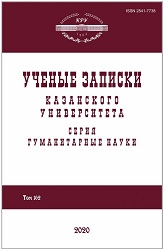Панвавилонизм в российской исторической науке первой трети XX века: от критики к эксплуатации
Panbabylonism in Russian Historical Scholarship of the First Third of the 20th Century: From Criticism to Exploitation
Author(s): Alisa Andreevna PopovaSubject(s): Political history, Government/Political systems, Politics and religion, Pre-WW I & WW I (1900 -1919), Interwar Period (1920 - 1939), History of Communism, Biblical studies
Published by: Казанский (Приволжский) федеральный университет
Keywords: panbabylonism; German historiography; Soviet historiography; Bible Studies; Old Testament; Christianity; Assyriology;
Summary/Abstract: In this paper, the influence of panbabylonism theories on the historical research in Russia during the pre-revolutionary and early Soviet eras was studied. The criticism of panbabylonism was discussed; the theories of its supporters were considered. The critics of panbabylonism were theologians (V.P. Rybinsky, N.S. Arsenyev) and historians (B.A. Turaev, N.M. Nikolsky). The strategies of their criticism were different. Theologians, who criticized the Assyriological narrative, used outdated theological theories based on the thesis of consistency of the Bible and God’s intervention in its creation, which, against the background of criticism from scholars, looked conservative, inappropriate, and unproven. The supporters of panbabylonism especially vividly proved themselves in the 1920s. In this period, when the Marxist approach to assessing historical events was not formed in the Soviet historiography, panbabylonism was used mainly to build a narrative that discredited religion and corresponded to the atheistic discourse of the Soviet government of that time. It was concluded that panbabylonism was not initially accepted by Russian historians, but was revived in the 1920s, when it could match the goals of the Soviet government. Subsequently, the scholars accepted and developed many of the concepts of panbabylonism, such as initial polytheism of all Semitic tribes, borrowing of Babylonian cultural concepts by Israel and their indirect influence on Christianity; assyriologists began to research the development of babylonian mathematics and astronomy.
Journal: Ученые записки Казанского университета. Серия Гуманитарные науки
- Issue Year: 162/2020
- Issue No: 3
- Page Range: 27-41
- Page Count: 15
- Language: Russian

